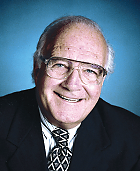Philadelphia psychiatrist Paul Fink, M.D., who was president of APA for the 1988-1989 term, died June 4 at age 81 after complications from a stroke.
“Paul Fink was a passionate and effective advocate for our patients and our profession,” commented former APA President Carolyn Robinowitz, M.D. “An outstanding creative leader in psychiatric education, he initiated the PRITE examination to document the knowledge base expected of all psychiatry residents. As an advocate, he addressed the stigma affecting not only those suffering from mental illness and their families, but also the clinicians providing care to them. His papers, ‘The Enigma of Stigma’ and ‘You Are the Only Sane Psychiatrist I Know,’ highlighted the issue, and his leadership of APA public affairs efforts led to the ‘Let’s Talk Facts’ series designed to inform the public and mental health professionals about mental illness and destigmatize its care.”
Psychiatric education was one of Fink’s career-long passions, and at the time of his death he was a professor in the Department of Psychiatry and Behavioral Science at Temple University, where he was on the faculty since 1985. He graduated from Temple’s medical school in 1958.
The chair of that department, William Dubin, M.D., called Fink “an inspirational teacher and mentor. He advocated humanism in medical education and treated medical students and residents with respect and dignity. He was a dynamic and engaging teacher who motivated both psychiatrists and nonpsychiatrists to think holistically.”
Olga Achildi, M.D., a former Temple psychiatry resident who is completing a fellowship at the University of Pennsylvania, commented, “Dr. Fink was an unstoppable force that drove our field and humanity. I recall the first time that I met him as a medical student and was mesmerized by his ability to stimulate intellectual curiosity. His influence on my career path has been tremendous.”
Another area about which Fink was passionate was youth violence and efforts to prevent it. “He was a strong advocate of the belief that early childhood abuse and neglect were the harbingers of potential future violent behavior,” Dubin said. “One of the guiding principles of his efforts was that ‘children learn to obey and produce best when they feel loved, when they are made to feel proud of what they are, and when they are guided by warmth and joy.’ Dr. Fink developed a rapid-response team of psychiatrists and community volunteers to go to violent-crime scenes and counsel any child who witnessed the violence. He was also involved in many organizations that worked with underprivileged youth and at-risk children and adolescents.”
Among the youth-related organizations with which he was involved were the Physicians Adopt-a-School Program, the Youth Homicide Committee, the Pennsylvania Attorney General’s Family Violence Task Force, the Anti-Violence Partnership of Philadelphia, and the Mayor’s Blue Ribbon Commission on Children’s Behavioral Health.
Maryam Namdari, M.D., who trained under Fink and is now on the faculty at Temple, said, “He showed genuine care for underprivileged youth whom everyone else neglected. It inspired all of us as residents to do more for the community that we worked in.”
Before joining the Temple faculty, Fink chaired the psychiatry departments at Eastern Virginia Medical School, Thomas Jefferson University Medical College, and Philadelphia’s Albert Einstein Medical Center.
“Paul was such an effective leader that he was elected president of almost every major psychiatric organization, and when his term was completed, the organization was stronger and more productive because of his contributions and direction,” Robinowitz said. ■

